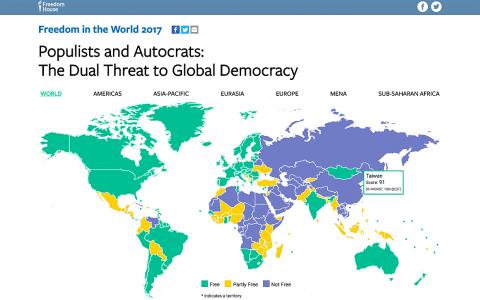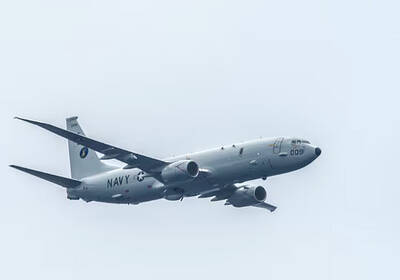Taiwan has been rated ahead of the US in Freedom House’s latest Freedom in the World report.
In the annual report released by the Washington-based rights watchdog on Tuesday, Taiwan scored 91 out of 100, beating out France (90), the US (89) and South Korea (82).
Taiwan was given a perfect score — one out of seven, with one representing the most free and seven the least free — in both political rights and civil liberties, as well as receiving one for overall freedom.

Photo: Screenshot from the Freedom House Web Site
The last time Taiwan scored the highest freedom rating was in 2006. Since then, its annual freedom rating had been 1.5.
Last year, Taiwan was rated one for political rights and two for civil liberties.
Freedom House attributed Taiwan’s improved civil liberties to its “demonstrations of media independence and academic freedom in recent years, including in media coverage of the 2016 elections.”
The report said that while the US elections demonstrated “the continued openness and dynamism of the American system,” they also showed that the US is not immune to populist appeals that are being seen across the Atlantic.
The report said that the global rise of populism — namely the UK’s Brexit vote, the US election results and the rising popularity of xenophobic political parties in the EU — marked last year as the 11th consecutive year of decline in global freedom.
Even countries that were previously rated “free” by the report suffered setbacks in political rights, civil liberties or both, including Brazil, the Czech Republic, Denmark, France, Hungary, Poland, Serbia, South Africa, South Korea, Spain, Tunisia and the US.
Of the world’s 195 nations, 87 (45 percent), were rated free; 59 (30 percent), were rated partly free and 49 (25 percent), were rated not free.
In the Asia-Pacific region, Cambodia, Laos, Vietnam, Thailand and China were all considered “not free,” scoring 31, 12, 20, 32 and 15 respectively.
The report said China received a low ranking because of “the chilling effect on private and public discussion, particularly online, generated by cybersecurity and foreign non-governmental organization laws, increased Internet surveillance and heavy sentences handed down to human rights lawyers, microbloggers, grassroots activists and religious believers.”
The state of freedom is evaluated by assigning points from zero to four on a series of 25 indicators for an aggregate score of up to 100.
These scores determine political rights and civil liberties ratings on a scale of one to seven. A nation or territory’s political rights and civil liberties ratings then determine whether it has an overall status of free, partly free or not free.
The Presidential Office yesterday said that the improvement in Taiwan’s freedom rating serves as proof that the nation’s long-term efforts in pursuing progressive values such as democracy, freedom and human rights have earned the recognition of the international community.
“We will continue to adhere to these values and deepen the nation’s democracy in the future, as part of our efforts to contribute to the stability and prosperity of the Asia-Pacific region,” the office said.
Additional reporting by Stacy Hsu

ROLLER-COASTER RIDE: More than five earthquakes ranging from magnitude 4.4 to 5.5 on the Richter scale shook eastern Taiwan in rapid succession yesterday afternoon Back-to-back weather fronts are forecast to hit Taiwan this week, resulting in rain across the nation in the coming days, the Central Weather Administration said yesterday, as it also warned residents in mountainous regions to be wary of landslides and rockfalls. As the first front approached, sporadic rainfall began in central and northern parts of Taiwan yesterday, the agency said, adding that rain is forecast to intensify in those regions today, while brief showers would also affect other parts of the nation. A second weather system is forecast to arrive on Thursday, bringing additional rain to the whole nation until Sunday, it

CONDITIONAL: The PRC imposes secret requirements that the funding it provides cannot be spent in states with diplomatic relations with Taiwan, Emma Reilly said China has been bribing UN officials to obtain “special benefits” and to block funding from countries that have diplomatic ties with Taiwan, a former UN employee told the British House of Commons on Tuesday. At a House of Commons Foreign Affairs Committee hearing into “international relations within the multilateral system,” former Office of the UN High Commissioner for Human Rights (OHCHR) employee Emma Reilly said in a written statement that “Beijing paid bribes to the two successive Presidents of the [UN] General Assembly” during the two-year negotiation of the Sustainable Development Goals. Another way China exercises influence within the UN Secretariat is

CHINA REACTS: The patrol and reconnaissance plane ‘transited the Taiwan Strait in international airspace,’ the 7th Fleet said, while Taipei said it saw nothing unusual The US 7th Fleet yesterday said that a US Navy P-8A Poseidon flew through the Taiwan Strait, a day after US and Chinese defense heads held their first talks since November 2022 in an effort to reduce regional tensions. The patrol and reconnaissance plane “transited the Taiwan Strait in international airspace,” the 7th Fleet said in a news release. “By operating within the Taiwan Strait in accordance with international law, the United States upholds the navigational rights and freedoms of all nations.” In a separate statement, the Ministry of National Defense said that it monitored nearby waters and airspace as the aircraft

Taiwan’s first drag queen to compete on the internationally acclaimed RuPaul’s Drag Race, Nymphia Wind (妮妃雅), was on Friday crowned the “Next Drag Superstar.” Dressed in a sparkling banana dress, Nymphia Wind swept onto the stage for the final, and stole the show. “Taiwan this is for you,” she said right after show host RuPaul announced her as the winner. “To those who feel like they don’t belong, just remember to live fearlessly and to live their truth,” she said on stage. One of the frontrunners for the past 15 episodes, the 28-year-old breezed through to the final after weeks of showcasing her unique